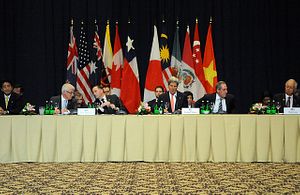There’s new momentum to the Trans-Pacific Partnership (TPP) negotiations with U.S. President Barack Obama signing the Trade Promotion Authority (TPA) bill into law after approval by the Senate. Other TPP countries can now proceed with negotiations confident that any final agreement will face a more streamlined ratification process in the United States. A TPP deal across the 12 nations that are part of the negotiation process now appears within reach, although challenges certainly remain.
Among residents of the TPP countries, public support for the TPP appears to be relatively solid. The Spring 2015 Global Attitudes Survey published in June by Pew Research, surveying roughly 1,000 residents in each country, found that public support for the TPP was especially strong in Vietnam (89 percent), Peru (70 percent), Chile (67 percent), and Mexico (61 percent). Public support amounted to approximately 50 percent in Japan, Australia, Canada, and the U.S., with 24 percent against in Japan and roughly 30 percent against in the other three countries. Support for the deal was weakest in Malaysia at 38 percent, with 18 percent against.
Despite the general support for the deal among the public, further works remains to be done in the actual negotiations.
Among the TPP countries, certain concerns stand out as priorities. The U.S.-Japan negotiation has been a key challenge, but both countries have made significant progress on two contentious sectors, agriculture and autos. During his April 2015 state visit to the U.S., Japanese Prime Minister Shinzo Abe said, “We are bringing great reforms toward the agriculture policy that’s been in place for decades. We are also bringing sweeping reforms to our agricultural cooperatives that have not changed in 60 long years.”
Malaysia’s primary sensitivity relates to its policy of providing preferential treatment for ethnic Malays, known as Bumiputera. Domestic companies, for example, must reserve 30 percent of equity for Bumiputera investors, while foreign corporations have to set aside 12.5 percent for all new listings. According to Dr. Shankaran Nambiar, a Senior Research Fellow at the Malaysian Institute of Economic Research (MIER), “The Malaysian government will seek to convince the other members that due recognition must be given for it to pursue the preferential treatment of the Bumiputera and Bumiputera participation in business. This is an issue that permeates other chapters such as government procurement and state-owned enterprises.” On the other hand, the U.S. has its own challenges with its “Buy American” provisions. Canada is one of the countries challenging the U.S. on this provision.
Australia, too, has its concerns. Graeme Thomson, a former chief negotiator with Australia’s Department of Foreign Affairs and Trade, states, “If highly protected sectors such as agriculture are not addressed or are only marginally addressed, this will be the major stumbling block for Australia.” According to Thomson, further liberalization of trade in services is also important. He goes on to note that other areas of sensitivity include “Investor State Dispute Settlement (ISDS), foreign investment liberalization, and intellectual property (IP) protection extension obligations particularly affecting health and pharmaceutical costs and labor and environment provisions. The degree of real sensitivity on these latter items will depend on the reach of the Agreement provisions.”
New Zealand sees big opportunities as well as challenges. Stephen Jacobi, Executive Director of the NZ International Business Forum, points out that the country lacks free-trade agreements with the U.S. and Japan. He notes, “New Zealand’s largest export earners are natural resource based products – dairy, meat, horticulture, wood, seafood. So clearly the most important issue is ensuring that these products benefit from the comprehensive removal of trade barriers in TPP.” Daniel Kalderimis, partner at law firm Chapman Tripp, points to “four particularly difficult issues for concluding the TPP agreement: the extent of market access concessions, the scope of IP rights protection, restraints on government procurement (especially of pharmaceuticals which are presently bulk-purchased in New Zealand) and the reach of ISDS.”
Vietnam views itself as an economy in transition and wants some flexibility in any agreement. During the meeting between Prime Minister Nguyen Tan Dung and U.S. Trade Representative Michael Froman on April 22, Dung reportedly raised the issue of Vietnam’s development in relation to its negotiating partners. Vietnam’s low wage environment gives it a particular advantage in labor-intensive industries such as apparel and footwear, which are a concern for other TPP countries.
As the national delegations seek to reach final agreement, TPP countries are also considering ratification issues. “Fast-track” authority has largely cleared the way to ratification in the U.S., with Congress being given an up-or-down vote on the entire agreement without the opportunity to make any specific amendments. In Australia, ratification would involve securing support from the opposition Labor Party, since the government does not currently have a majority in Australia’s Senate.
Three countries where ratification is assumed to be relatively straightforward are Singapore, Brunei, and Vietnam. According to Ambassador Barry Desker, a past head of Singapore’s Institute of Defence and Strategic Studies, “Singapore regards the TPP as a ‘state of the art’ agreement on intellectual property, services and government procurement. Unlike the U.S., the process of ratification is less contentious in Singapore. Ratification is a decision of the Cabinet and would not require parliamentary approval.” In the monarchy of Brunei, a trade agreement is likely to be passed easily if the Sultan sees it as being in Brunei’s best interests. In Vietnam, a one-party communist state, passage of the TPP, once recommended by the prime minister, should be endorsed by the 498 representatives of the national assembly.
Although TPP negotiations are in the home stretch, some key issues require hard decisions by respective governments and some major ratification issues will need to be resolved before a final agreement can be reached and implemented.
Shom Sen was the 2014 Jack Wadsworth Fellow at the Asia Society. The views expressed are his own.

































